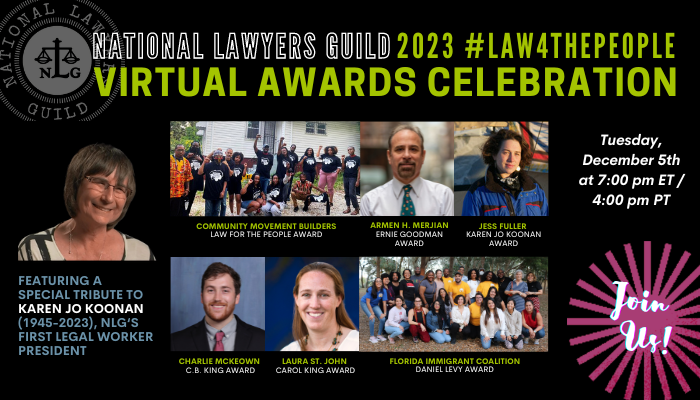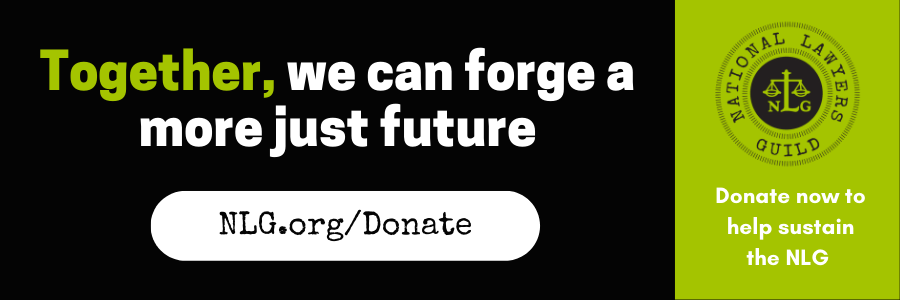Author: David Gespass
Date: 01/23/2024
At the NLG Leadership Summit that happened last October, I was having dinner with some younger members. At my age, of course, pretty much all members are younger. I have been a Guild member longer than the parents of the members of this group have been alive. Anyway, they were asking me about what it was like way back in the 20th century. I will assume they were really interested and not just trying to be nice to a geriatric colleague in hopes that he would have fond memories of when he was lucid, psychedelics notwithstanding. So I have decided to do a series of reminiscences to share with today’s youth whatever I can.
There are a few caveats. First, these are my best recollections. I did not maintain a journal or record anything contemporaneously, not thinking anything I said or did was really worth it. Perhaps these accounts will justify that long-held belief. In any event, I cannot vouch for absolute accuracy. I do hope that there will be some useful insights (I wouldn’t begin to think there might be wisdom). Mostly, however, I hope they will be amusing. Towards the end of a conversation Jon Stewart had with British satirist Ian Hislop, Hislop told of a pair of Croatian satirists who were publishing stuff at the height of the Balkan wars. He told them how courageous he thought they were and they said they didn’t care about that, they just wanted to know if they were funny. Anyway, if I can be funny, I’ll be satisfied. If there’s anything useful, I’ll be overjoyed. I’ll try to make it chronological, but it will be a kind of stream of consciousness, so I may skip around a bit.
That being said, I heard Angela Davis in Birmingham a couple of years back and she talked about standing on the shoulders of leaders of the past. What, she asked, does it mean to stand on someone’s shoulders. Her answer: “It means you can see further.” Being able to see further requires a couple of things. Most importantly, it means you have to get up on those shoulders, lest you stay on the ground and can’t see much because of all the shoulders in the way. The quid for that quo is that those whose shoulders you stand on must be willing to provide them with the recognition that everything they believed is subject to change. My shoulders aren’t that tall or strong, but they are offered for whatever they are worth. Parenthetically, a number of lawyers younger than I have called me a mentor, but I have never been comfortable with that appellation. It implies that all the education goes one way, that the “mentor” imparts knowledge for the “mentee” to absorb. I just think that I learn at least as much from those friends as I teach. And I’m not so arrogant as to think I’m the fount of all wisdom. Hell, I’m not sure I’m the fount of any wisdom.
I recall a conversation an old law school friend of mine, John Zwerling, had with one of the three DC lawyers, Selma Samols, who remained in the Guild in the face of McCarthyism and stayed in the face of the then-youth and their weird ways. The three were all either members of the Communist Party or very close to it and were certainly Marxists. Selma insisted that, to do political work, one needed an ideology and John said he hoped we young people could develop our own. I think both were right. On the one hand, an ideology should not be created out of whole cloth like, to mix metaphors just for the hell of it, Athena from the head of Zeus. On the other hand, new and different conditions and greater knowledge demand that ideology adapt and evolve, so that new generations can legitimately claim it as their own.
I’m so old my law school career predated 1L, 2L and 3L. We had freshman, junior and senior classes, presumably because it was unthinkable for future lawyers to be sophomoric. Anyway, during my senior year, 1969, we were at the height of the Vietnam War and Eric Seitz, then the Guild’s executive secretary, came to Washington, DC to rebuild the organization after its near-extinction during the years of the “Red Menace.” About 40 students filled the moot courtroom to hear him recount the courage of those who stood firm against McCarthyism, how the Guild began to recover in support of the Civil Rights Movement and its continuing resurgence with the massive movement against the Vietnam War. He was hoping to reestablish the DC chapter (did I mention I went to law school in Washington?) and to establish chapters in the city’s schools. After he spoke and following some discussion, Kathy Douglas, who was a first year student and then the young wife of Justice William O. Douglas , got up and moved that we form an American University Law School chapter “and that David Gespass be the first president.” What I learned later was that she was sitting with one of my three housemates, all of whom were in their junior years, who suggested she nominate me because I had only a year left and the chapter would still have the benefit of the four of us. Thus began what has generally been my accidental ascensions over the years in NLG leadership. It is nice to know that the chapter we formed back in 1969 has continued through the decades with the typical ebbs and flows that student organizations experience.
Our chapter accomplished a number of things that year. Indeed, I continue to believe that my greatest contribution to making the legal profession more one, as Dean Charles Hamilton Houston suggested, of social engineers than parasites on society was my last year in law school.
As I said, we were in Washington, DC the population of which, at that time, was more than 90% Black, yet the student body had maybe four or five Black students in all three classes. The chapter teamed with one of those students, Peter Ridley, who constituted the school’s entire membership of what, if memory serves, was called the Law Students Civil Rights Research Council (LSSCRC). A letter was drafted decrying the composition of the law school, along with a demand for recruitment of, and scholarships for, Black students. The dean of admissions spoke to students in defense of his policies and was pilloried. In the end, the school agreed, not to scholarships, but for ten “tuition remissions” for Black students in each new class.
We also – as skilled lawyers do – investigated the condition of the law school and then exaggerated (lied about) the potential problems, arguing that we were in jeopardy of losing our accreditation because the library was too small, the student-teacher ratio was too great, there was an insufficient number of full-time faculty and maybe some other stuff. We went so far as to march to, and sit-in at the office of the university president to protest the dire conditions at the school.
Finally, we demanded that students have a more meaningful voice in law school administration. The “student bar association” and its elected representatives had no actual power. By the end of the year, primarily because of our chapter, we had established a governing body for the school composed of one-third students, one-third faculty and one-third administration. Incidentally, the chapter didn’t have committees. We called them “action groups” and they were pretty active.
More importantly, the dean of admissions resigned and the dean of the school took a three-year sabbatical to teach in Africa. While the next year’s class was carefully chosen to avoid activists, the school was transformed over the years. The new dean implemented lots of changes and the school today can take pride in its diversity. It has grown in size and quality. It produces more than its fair share of social engineers. If I were to apply today with the credentials I had back then, I would not have a ghost of a chance of being admitted.
While the student chapter concentrated a great deal on the law school, we also played an active role in the DC chapter. Washington was, of course, the site of enormous anti-war demonstrations and much of the focus of chapter activity was around support for protesters. This was before the Guild had its legal observer program and its protocols and the chapter took some pride in the fact that the chair of the committee charged with assisting in demonstrations (I can’t recall what the actual name was) was one of the first people arrested at the first demonstration we covered. There was Matt Zwerling (no relation to John) in the cells dispensing legal advice.
Enough for now. Next time, more reminiscences of my early days as a lawyer in the DC Guild. I will just mention that the first cases I was involved in were the May Day prosecutions when some 12,000 people were arrested. The slogan for the demonstrations was, “If the government won’t stop the war, we’ll stop the government.” Heady times, indeed.



